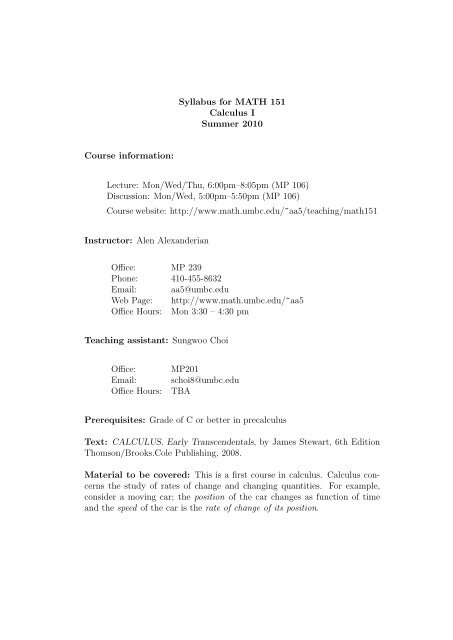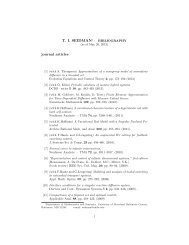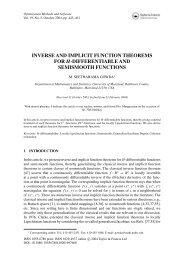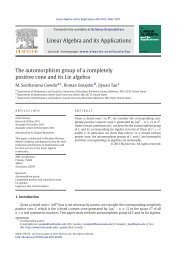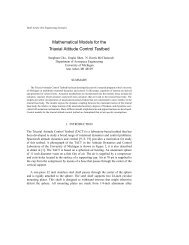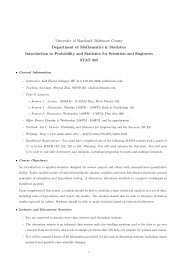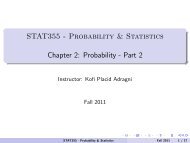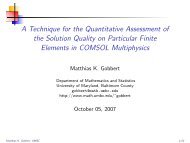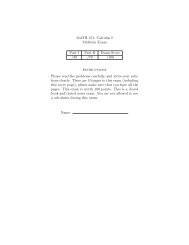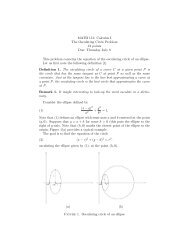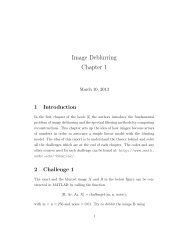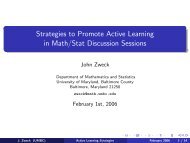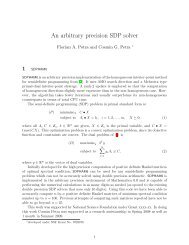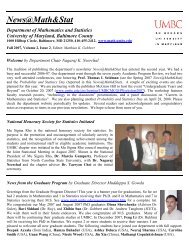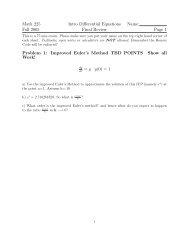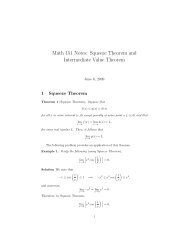Syllabus for MATH 151 Calculus I Summer 2010 Course ... - UMBC
Syllabus for MATH 151 Calculus I Summer 2010 Course ... - UMBC
Syllabus for MATH 151 Calculus I Summer 2010 Course ... - UMBC
Create successful ePaper yourself
Turn your PDF publications into a flip-book with our unique Google optimized e-Paper software.
<strong>Syllabus</strong> <strong>for</strong> <strong>MATH</strong> <strong>151</strong><br />
<strong>Calculus</strong> I<br />
<strong>Summer</strong> <strong>2010</strong><br />
<strong>Course</strong> in<strong>for</strong>mation:<br />
Lecture: Mon/Wed/Thu, 6:00pm–8:05pm (MP 106)<br />
Discussion: Mon/Wed, 5:00pm–5:50pm (MP 106)<br />
<strong>Course</strong> website: http://www.math.umbc.edu/~aa5/teaching/math<strong>151</strong><br />
Instructor: Alen Alexanderian<br />
Office: MP 239<br />
Phone: 410-455-8632<br />
Email: aa5@umbc.edu<br />
Web Page: http://www.math.umbc.edu/~aa5<br />
Office Hours: Mon 3:30 – 4:30 pm<br />
Teaching assistant: Sungwoo Choi<br />
Office:<br />
Email:<br />
Office Hours:<br />
MP201<br />
schoi8@umbc.edu<br />
TBA<br />
Prerequisites: Grade of C or better in precalculus<br />
Text: CALCULUS. Early Transcendentals, by James Stewart, 6th Edition<br />
Thomson/Brooks.Cole Publishing, 2008.<br />
Material to be covered: This is a first course in calculus. <strong>Calculus</strong> concerns<br />
the study of rates of change and changing quantities. For example,<br />
consider a moving car; the position of the car changes as function of time<br />
and the speed of the car is the rate of change of its position.
We will begin our study of calculus by learning about the very important<br />
concept of the limit. Then, we will discuss the concept of continuity and its<br />
consequences. After developing these basic but important concepts, we will<br />
define the notion of the derivative. Next, we will learn various differentiation<br />
rules and do a lot of practice in computing derivatives. We will also see some<br />
applications of the concept of derivative later in the course. Towards the end<br />
of the course, we will begin the study of the concept of integration. We will<br />
end our discussion of calculus by introducing the Fundamental Theorem of<br />
<strong>Calculus</strong>.<br />
For more in<strong>for</strong>mation on the topics covered, please see the <strong>Course</strong> Calendar<br />
in the course website.<br />
Homework: All homework will be done (and graded) on-line through WebAssign<br />
and will be due each Monday at midnight. Please keep a record<br />
of your homework scores and a print-out of each completed homework in<br />
case there is a problem with the computer system. There will be no late<br />
homework. Only the 6 best homework grades will be counted (out of 7).<br />
WebAssign section code: umbc 4679 7523<br />
Quizzes: There will be a total of 11 quizzes, out of which the 8 best<br />
scores will be counted towards your final grade. There will be no makeup<br />
quizzes! The quizzes will be generally brief (20-30 minutes), and will be<br />
given during the Discussion Sessions. The purpose of the quizzes is to provide<br />
students quick feedback on their understanding of the concepts covered<br />
in the class.<br />
Exams: There will be a mid-term and a final exam. The final exam will not<br />
be comprehensive and will focus on the topics covered after the mid-term.<br />
However, to do well in the final students should understand the material<br />
covered throughout the whole course.<br />
Make-up policy: Make-up exams are given only in a case of an emergency<br />
(notification should be given to the instructor within 24 hours be<strong>for</strong>e or after<br />
the scheduled exam time, documentation required).
Grading: The course grade will be based on homework, quizzes, a midterm,<br />
and a final exam. The following table shows the contribution of each of these<br />
components to your course grade.<br />
Homework 15%<br />
Quizzes 30%<br />
Midterm 25%<br />
Final 30%<br />
Your final letter grade will be computed according to the following guidelines.<br />
Suppose s is your course average based on your per<strong>for</strong>mance in homework,<br />
quizzes, and exams.<br />
90 ≤ s ≤ 100 A<br />
80 ≤ s < 90 B<br />
70 ≤ s < 80 C<br />
60 ≤ s < 70 D<br />
s < 60 F<br />
Extra credit: I will provide opportunities <strong>for</strong> students to earn some extra<br />
credit throughout the course. The details will be discussed in the class.<br />
Calculators: Students are not allowed to use a calculator during quizzes<br />
and exams.<br />
Tutoring: Free walk-in tutoring is available at the Mathlab located in the<br />
basement of the library (x52444 <strong>for</strong> more details).<br />
Study suggestion: This is a non-trivial course. You should expect to spend<br />
at least 15 hours a week studying. Come to class prepared by looking over<br />
the sections that are going to be covered during the lecture (look at course<br />
calendar to see what topics will be covered in a given lecture). Even if you<br />
briefly look over the relevant sections, you will be in a much better position to<br />
understand the material covered in the lecture. When you study, read your<br />
lecture notes and also the relevant sections in the book. You need to study<br />
regularly so you have a thorough understanding of the concepts discussed
in the lecture. Then, you need to practice applying the concepts you have<br />
learned by solving problems. Note that solving the homework problems in<br />
MathZone is not sufficient practice. You should try to solve as many of the<br />
problems in the book (at the end of each section) as possible. The answers<br />
to odd numbered problems is provided at the end of the book so you can<br />
check your answer <strong>for</strong> those.<br />
<strong>UMBC</strong> academic integrity policy: By enrolling in this course, each student<br />
assumes the responsibilities of an active participant in <strong>UMBC</strong>’s scholarly<br />
community in which everyone’s academic work and behavior are held to the<br />
highest standards of honesty. Cheating, fabrication, plagiarism, and helping<br />
others to commit these acts are all <strong>for</strong>ms of academic dishonesty, and they<br />
are wrong. Academic misconduct could result in disciplinary action that may<br />
include, but is not limited to, suspension or dismissal. To read the full Student<br />
Academic Conduct Policy, consult the <strong>UMBC</strong> Student Handbook, the<br />
Faculty Handbook, or the <strong>UMBC</strong> Policies section of the <strong>UMBC</strong> Directory.


